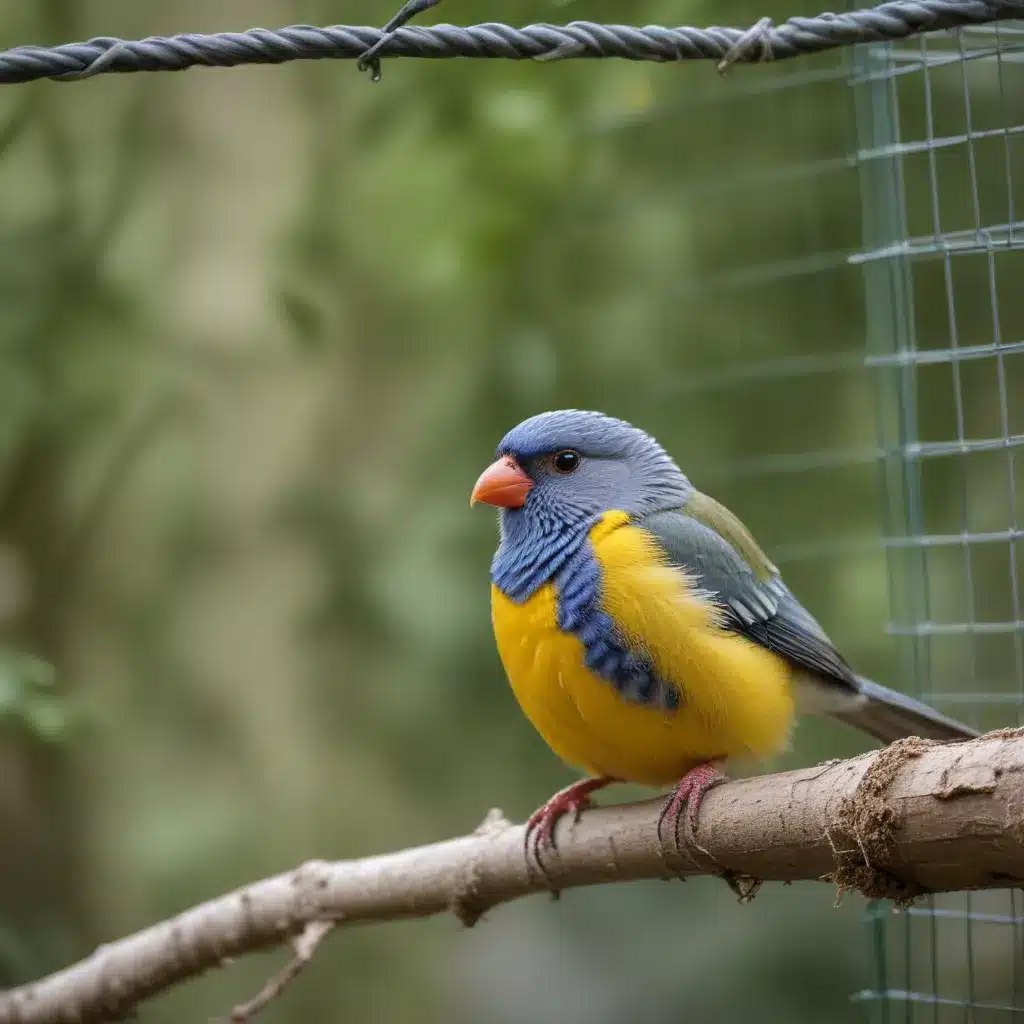
Aviary Fundamentals
As an experienced avian caretaker, I’ve had the privilege of working with a wide variety of bird species over the years. One of the most important aspects of responsible bird ownership is ensuring that your aviary or habitat setup caters to the unique needs of your feathered friends. When designing an aviary, there are several key factors to consider.
First and foremost, the size of the enclosure is crucial. Birds need ample space to stretch their wings, hop, and engage in natural behaviors like flying, foraging, and perching. A good rule of thumb is to provide at least 24 inches of height, 36 inches of width, and 48 inches of length per bird. Of course, this can vary depending on the specific species, as larger birds like macaws and cockatoos will require even more spacious accommodations.
In addition to generous dimensions, the aviary should offer a diverse array of perches at varying heights and diameters to mimic the bird’s natural environment. Incorporating a variety of natural branches, ropes, and even PVC pipes can help fulfill their instinctual need to climb and explore. Proper substrate is also essential, as birds will spend a significant amount of time on the floor. Soft, absorbent bedding like aspen shavings or paper-based litter is recommended.
Ventilation and lighting are two other pivotal elements in creating a healthy avian habitat. Adequate airflow not only helps regulate temperature and humidity but also reduces the buildup of odors and airborne contaminants. Positioning the aviary near a window or incorporating fans can ensure a constant supply of fresh air. Proper lighting, whether natural or artificial, is crucial for maintaining the bird’s circadian rhythms and supporting their overall well-being.
Finally, don’t forget to include enrichment elements that encourage natural behaviors and mental stimulation. This can include swings, ladders, foraging toys, and even small bathing dishes. By catering to the bird’s physical and psychological needs, you can help ensure they thrive in captivity.
Bird Nutrition
Providing a balanced and nutritious diet is another essential aspect of avian care. While the specific dietary requirements can vary among species, there are some general guidelines to keep in mind. A well-rounded diet should consist of a high-quality pellet or seed mix as the foundation, supplemented with fresh fruits, vegetables, and occasionally cooked whole grains or lean proteins.
It’s important to note that many common household foods, such as avocado, chocolate, and onions, can be toxic to birds and should be strictly avoided. Additionally, some birds may require specialized supplements to ensure they’re receiving all the necessary vitamins and minerals. Consulting with an avian veterinarian or experienced aviculturist can help you determine the appropriate supplementation for your feathered friend.
When it comes to feeding, it’s best to provide a consistent schedule and portion sizes. This not only helps maintain a healthy weight but also reduces the risk of behavioral issues like feather-plucking or excessive begging. Lastly, always ensure that your bird has access to clean, fresh water at all times, as proper hydration is crucial for their overall well-being.
Common Health Concerns
Preventative care and early detection of potential health issues are paramount in avian husbandry. Some of the most common avian ailments include respiratory infections, gastrointestinal disorders, and feather or skin conditions. Recognizing the early warning signs, such as lethargy, decreased appetite, or changes in droppings, can help you address problems before they escalate.
Regular veterinary check-ups are highly recommended, even for seemingly healthy birds. An experienced avian vet can perform comprehensive physical examinations, recommend appropriate vaccinations, and provide guidance on maintaining your bird’s optimal health. Incorporating proactive measures like proper cage sanitation, quarantine protocols for new birds, and vigilant monitoring can also go a long way in preventing the spread of illness.
It’s also crucial to be aware of the potential risks associated with certain bird species or housing arrangements. For example, introducing a new bird to an existing flock can sometimes trigger aggressive behaviors or even outbreaks of disease. Consulting with experts and thoroughly researching the specific care requirements for your birds can help you navigate these challenges successfully.
Bird Behavior and Training
Understanding avian behavior and temperament is a crucial aspect of responsible bird ownership. Each species and even individual bird can exhibit unique personality traits and behavioral patterns. Familiarizing yourself with common behaviors, such as feather fluffing, wing-flapping, and vocalization, can help you better interpret your bird’s emotional state and needs.
Positive reinforcement training is an invaluable tool for building trust, enhancing cooperation, and addressing any behavioral concerns. By rewarding desirable behaviors with treats or affection, you can encourage your bird to willingly participate in essential husbandry tasks like nail trims, veterinary examinations, and even simple tricks. This not only strengthens the bond between you and your feathered companion but also helps minimize stress and ensure their overall well-being.
It’s important to remember that birds are complex, intelligent creatures, and their care requires a significant investment of time and effort. By educating yourself, providing a stimulating and enriching environment, and fostering a positive relationship with your bird, you can ensure a lifetime of companionship and fulfillment.
If you’re in the market for a new avian companion or are simply looking to enhance the care of your existing feathered friends, I highly recommend exploring the wide selection of products and resources available at Mika Birds Farm. Their team of experienced avian experts is dedicated to providing the highest quality supplies, advice, and support to help you create a safe and thriving aviary environment.


